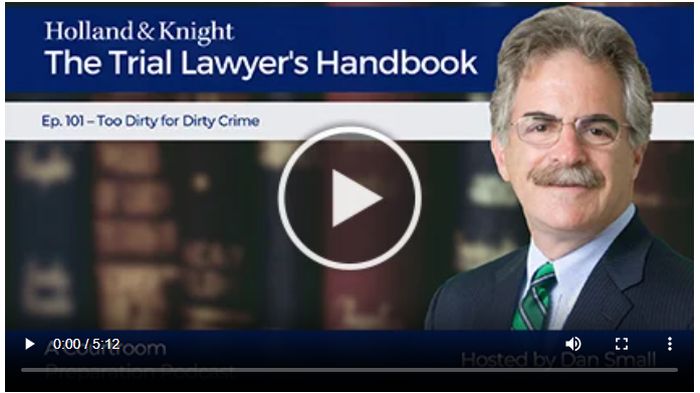- within Criminal Law topic(s)
- in United States
In this episode of his "The Trial Lawyer's Handbook" podcast series, litigation attorney Dan Small talks about his experience prosecuting the Cammarata Organization while serving with the U.S. Department of Justice's (DOJ) Organized Crime Strike Force. Mr. Small explains how traditional organized crime groups struggled with the transition into drug trafficking, a business they once saw as off-limits. He details how the Cammarata group's excessive ambition and reliance on violence undermined their criminal enterprises, including failed international deals and brutal tactics that ultimately led to their downfall. This episode explores the realities of investigating organized crime, the economic principles underlying illegal enterprises and how prosecutors use evidence of violence to portray criminal organizations in court.
Listen to more episodes of The Trial Lawyer's Handbook here.
Mr. Small is also the author of the American Bar Association (ABA) book Lessons Learned from a Life on Trial: Landmark Cases from a Veteran Litigator and What They Can Teach Trial Lawyers.
Podcast Transcript
Daniel Small: The Cammarata organization, the would-be godfather of Houston, Texas, that I prosecuted as a young lawyer with the U.S. Department of Justice's (DOJ) Organized Crime Strike Force, engaged in a wide range of traditional criminal enterprises: loan sharking, prostitution, bookmaking, theft, extortion, you name it. But not drug dealing. In the traditional Mafia world that Sam Cammarata came from, drugs were "dirty." Only young punks or druggies sold drugs. And drugs could hurt families, even Mafia families. Kill if you had to, but don't sell drugs.
Ah, but the Bible says, "The love of money is the root of all evil." And selling drugs, it turns out, makes money. Lots of money. Sam and his associates watched while these young punks made more money on one drug deal than they might make in a month of their crimes, their traditional crimes. And so finally they got into the drug business. They made money, but not as much as they'd hoped. Two problems held them back: They were overly ambitious and overly violent. Drugs is, after all, a business like any other. The same economic principles apply. It just happens to be illegal. Almost any business starts out relatively small, then hopefully grows in a way that is both successful and sustainable. Many businesses have failed to do this. Ambition is good, but it must be tempered with reality.
For the Cammarata organization, the ambition problem was highlighted in Lebanon of all places. One member of the organization had some Lebanese contacts. After some back and forth, they began discussing an extraordinary guns-for-drugs deal with those contacts. But Cammarata's people oversold their access to the high-end weapons that the Lebanese wanted. And when they sent someone to negotiate the drug part of the deal, it got worse. One of Cammarata's men, who had basically never left Texas, walking the streets of Beirut, trying to negotiate with Lebanese drug lords. Well, he was lucky to get out alive, and the deal never happened.
The other problem was violence. Sam Cammarata's number two man, Tommy Teutsch, was vicious and violent. He believed that violence was the answer to almost everything. So that's how they approached the drug business. They'd set up a drug buy and then assault or murder the sellers and steal their drugs. Or they'd set up a drug sale and then assault or murder their buyers and steal their money. It made for quick and easy profits. But they couldn't figure out why they weren't making as much money as the punk dealers that they had emulated to begin with.
Any good businessman could have told them: True success in a business like this is not defined by the first sale. It's defined by developing relationships, repeat business, secure transactions. It didn't take long for the word to get out within the drug community: "Stay away from those guys. They'll rip you off." They made money, but not the riches they had dreamed of that had lured them into the business in the first place.
It's ironic, isn't it? They had stayed away from drug dealing because it was "dirty," but once they crossed that line, it was their own brand of "dirt" that kept them from reaping the profits. Many of those they killed were not sympathetic characters, to say the least, but the level of violence they used allowed us as prosecutors to portray them to the jury as a dangerous and evil enterprise. And it worked.
The content of this article is intended to provide a general guide to the subject matter. Specialist advice should be sought about your specific circumstances.


